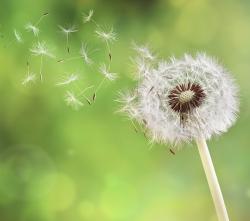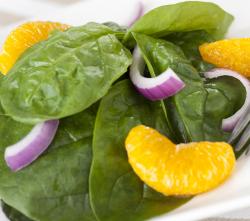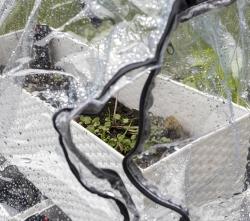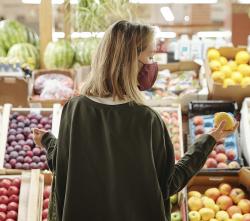Staying Healthy – Reducing Seasonal Allergies when Outdoors
Recipes and Nutrition Tips – Manage Food Allergies by Reading Food Labels
Physical Activity Tips – Being Active Outdoors During Allergy Seasom
Food Access Resources in Massachusetts – Using HIP Benefits at Farmers' Markets
Staying Healthy
 Manage your outdoor seasonal allergies.
Manage your outdoor seasonal allergies.
Springtime brings flowers, blooming trees and seasonal allergies. Symptoms include congestion, itchy eyes, nose and mouth, sneezing, runny nose, coughing, and wheezing. Discuss your symptoms and treatments with your doctor. Allergy testing can identify the source of the allergy. Pollens from trees, grass, ragweed, and mold spores reach their highest levels at different times of the day and the season. Follow these tips to reduce allergy exposure this spring:
- Wear protective long sleeved clothing, facemasks, and eyewear like sunglasses when working outdoors.
- Shower after long periods outside to wash off pollen stuck to your skin and hair.
- Keep pollen out of the house. Dust and vacuum often. Use air-conditioning instead of fans which stir up pollen. Keep windows and doors closed when the pollen count is high.
- Check pollen counts online when planning outdoor activitiies.
Recipes and Nutrition Tips
 Read food labels and substitute ingredients for food allergies.
Read food labels and substitute ingredients for food allergies.
Food allergies are extremely common. Although there is no cure for a food allergy, they can be managed by avoidance, recognition, and treating the symptoms. To avoid the allergen read every food label and ingredient list. Food labeling laws require listing the top eight food allergens. For more information on how to live with food allergies, check out https://www.foodallergy.org/resources/how-read-food-label. Try our Sunny Salad recipe; it is free from the top eight food allergens. Watch how to make a delicious salad with vinegarette dressing from USDA’s Team Nutrition Cooks Series. https://video.link/w/a5unc
Physical Activity Tips
 Find ways to be active outdoors during allergy season.
Find ways to be active outdoors during allergy season.
Do you enjoy being active outdoors but struggle with seasonal allergies? Here are some suggestions that may help keep seasonal allergy symptoms on the sidelines.
- Depending on your allergy, you may want to avoid going outdoors at certain times of the day.
- Before heading out, check the pollen count at www.pollen.com and the local weather.
- If you need medication to manage allergies, start taking it before symptoms flare up.
- Choose the right exercise. An aerobic activity, like jogging that increases your breathing level may not be the best choice if you have spring allergies. Pay attention to how you’re feeling during the activity. Try activities such as yoga, stretching, and full body strengthening if you’re having allergy symptoms.
- Avoid exercising in areas with high concentrations of allergens, like fields, areas with many fields, or busy roads, and factories.
 Protect your garden from frost.
Protect your garden from frost.
When planting your seeds or young seedlings in the spring, a sudden frost might be the last thing on your mind. It is important to protect your plants. Cover them with items from around your home, such as plastic sheets, canvas tarp, beach towels, tablecloths, or bed sheets. Avoid moisture buildup under plastic covers. Moisture can increase the risk of fungal diseases on the seedlings. With a little effort, you can protect your garden from frost damage and extend your growing season from spring to fall.
Food Resources in Massachusetts
Warmer weather brings back the spring tradition of outdoor farmstands and farmers’ markets. Take advantage of HIP this Spring. HIP puts money back on your EBT card when you use SNAP benefits to buy healthy, local fruits and vegetables from HIP farm vendors. To locate farmers’ markets near you, visit this interactive map at https://massnrc.org/farmlocator/map.aspx
